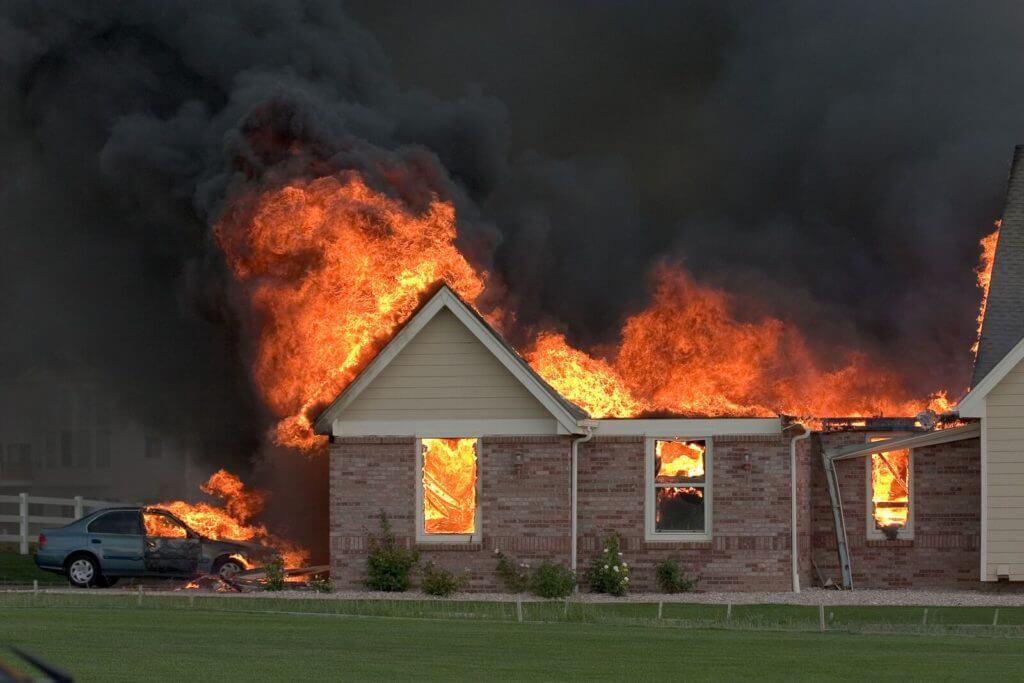Most homeowners are familiar with the most common causes of home fires. But familiarizing yourself with unexpected causes of fires can help you take preventive actions. Learn more about the causes of house fires and what to do after a fire in your home.
Top Causes of Home Fires
A look at the leading causes of home fires reveals no surprises. According to the National Fire Protection Association, the top five causes of home fires are:
- Cooking
- Heating Equipment
- Electrical distribution and lighting equipment
- Intentional
- Smoking materials
Cooking, the number one cause, led to more house fires than all others combined.
4 Unexpected Fire Hazards in Your Home
To help you identify potential safety problems in your home, Consumer Reports notes a few fire hazards you might not know about.
Extension cords and power strips
Using too many or the wrong appliances with extension cords can cause a fire. Some types of appliances should always plug directly into a wall outlet. These include appliances that heat or cool, like space heaters, air conditioners or toaster ovens. Using these with an extension cord risks overloading its capacity, causing it to overheat, which could lead to a fire.
Lithium-ion Batteries
In recent years, lithium-ion batteries have caused an increasing number of fires. Electric bikes and scooters have this type of battery. A chemical reaction that can lead to fire occurs if a defective lithium-ion battery overheats.
To safely use these batteries, use the manufacturer’s charger instead of a generic brand. Avoid charging the battery overnight and charge your electric bike or scooter outdoors, if possible.
Furnaces
Keep your furnace maintained to avoid a buildup of flammable debris. Schedule furnace inspections at least once a year. Vacuum the system during the heating season. Replace filters monthly or as recommended by the manufacturer. Keep flammable materials at least 10 to 15 feet away from the furnace.
Fireplaces and Wood Stoves
If you have a wood stove, burn only firewood, not other materials like trash or driftwood. Build small fires and keep the stove’s vents and flue clear. Don’t let ashes build up in your fireplace and have the chimney cleaned and inspected annually.
What You Should Do After a Fire
These safety measures will reduce the risk of a home fire. But if fire damages your home, hazards persist even after the flames are extinguished. Fire damage restoration experts at SERVPRO have this advice for what to do after a fire.
- Limit Movement. To keep soot from being embedded in furniture and carpets, limit movement in the home.
- Cover Traffic Areas. Put clean towels or old linens on furniture and cover rugs in areas of traffic.
- Empty the Refrigerator. If the power is off, empty the refrigerator and freezer and prop the doors open.
- Change Filters. Smoke and soot may have entered your HVAC system. Change all of your filters. Open windows to air out the house.
- Call your insurance company. Homeowners insurance policies will cover the cost of repairing or rebuilding your home. If you need to move temporarily, they will cover the cost of food and lodging.
Contact a Fire Damage Restoration Service
A company that specializes in fire damage restoration has the expertise to clean and repair fire damage and remove the smell of smoke. For example, SERVPRO, the nation’s leading fire cleanup and restoration company, starts the process by inspecting your home and belongings to determine the extent of damage.
To protect your home from the elements, they will board up windows and tarp the roof. Restoration experts use specialized tools to remove smoke and soot from walls and other surfaces. The next step is cleaning and sanitizing hard surfaces, followed by managing repairs and reconstruction.
What Not to Do After a Fire
There are a few things you shouldn’t do after a fire:
- Don’t wash walls or carpet. Using the wrong product could cause additional damage.
- Don’t clean electrical appliances that were exposed to fire or water.
- Don’t eat food exposed to fire, heat or water.
- Don’t turn on ceiling lights if the ceiling is wet or sagging.
- Don’t send your clothes to an ordinary dry cleaner. It could set in the smoke odor.
- Avoid touching soot-covered surfaces. The oil from your fingers could cause a permanent stain.
Avoiding Fire Hazards in Your Home
With caution, preventive maintenance and using equipment as intended, you can reduce the risk of home fires. If a fire breaks out in your home, be careful about moving around or touching surfaces covered with soot. Call your insurance company and a restoration service promptly to begin the repair process.

